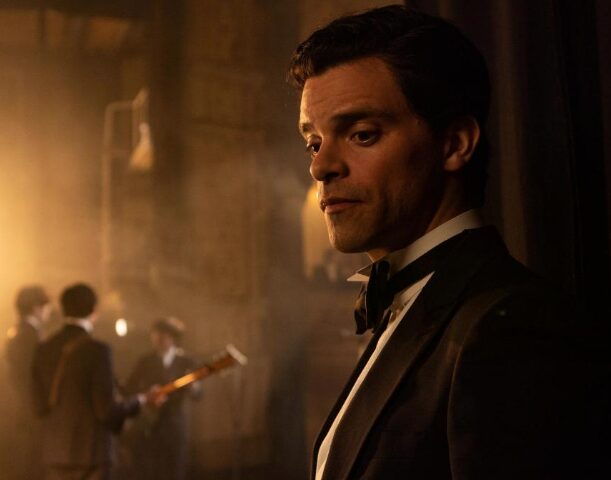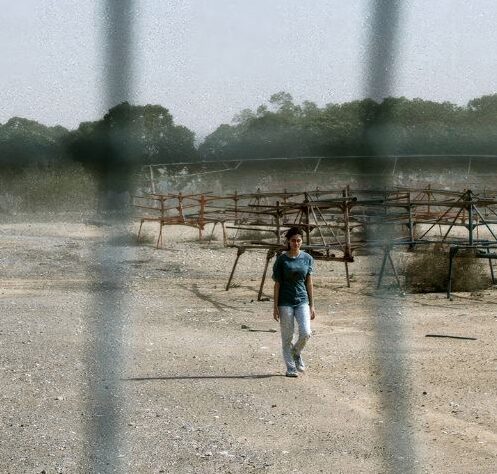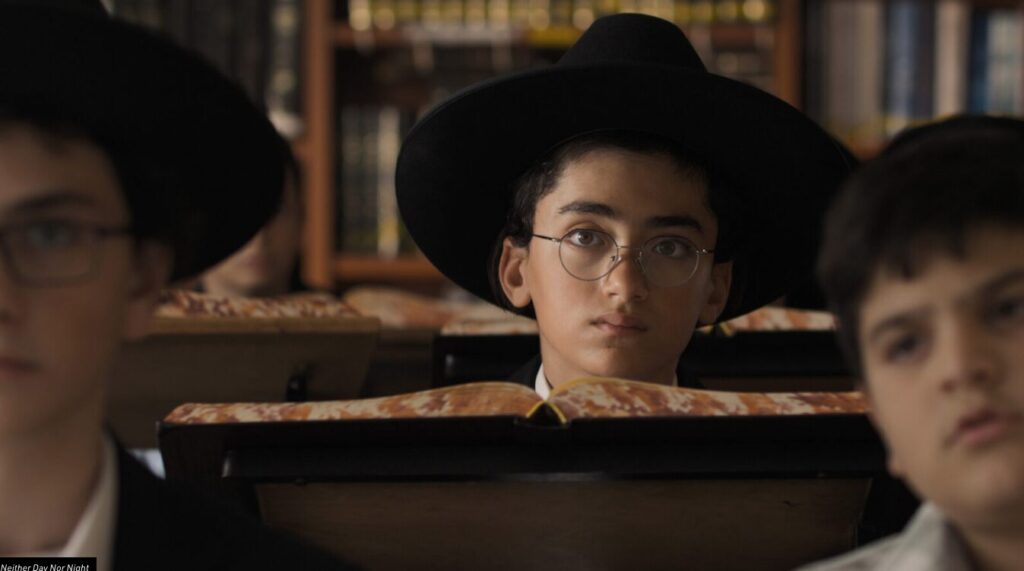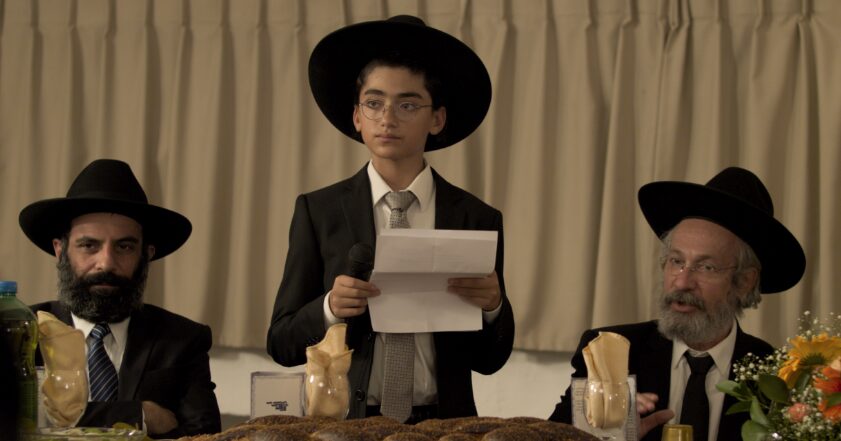New York Jewish Film Festival Jan. 15-29

Lincoln Center hosts a dramatic panorama from 1964 Beatlemania to 10/7/23 terrorism in Israel
Buried deep in this year’s NYJFF menu of 23 international films is a 1922 orphan, Breaking Home Ties. It’s a silent drama of a hothead young Russian lawyer who flees Saint Petersburg and emigrates to Manhattan’s Lower East Side, followed by his parents. The young man muddles along, helping his father care for his ill mother, who lives to see her son happily marry. It’s among the first motion pictures to depict everyday Jewish life and rituals.

The 78 minute drama was produced by Jewish filmmakers, and its prelude titles explain it was made “to combat rising anti-semitism stoked by the Ku Klux Klan and Henry Ford.” Its one surviving distribution print was discovered by the National Center for Jewish Film in Berlin, heavily damaged. The Center took on the restoration process, stabilizing the images and replacing its German intertitles with an English translation. Breaking Home Ties is one example of how this festival, co-sponsored by The Jewish Museum and Film at Lincoln Center, has strived for 34 years to find and show the most significant dramas, documentaries and shorts that define the Jewish experience.
Here are this year’s three Critic’s Choices. All will receive robust distribution via Menemsha, the premiere distributor of Jewish cinema. Each is a first of its kind, all standing on the shoulders of a silent pioneer over a century ago.
Midas Man: Joe Stephenson: 2024: United Kingdom: 112 minutes

This is the first NYJFF Opening Night drama in which the lead character, Brian Epstein, is not only Jewish but gay. As well as the first manager of the Beatles in the 1960s. As well as a cross-addicted drunk and pill-popper who would die of an overdose at age 32. Think of the cross-over possibilities—a movie with simultaneous and significant appeal to Jewish moviegoers, the LGBT community, Beatles lovers, and the recovery network.
As former mayor Ed Koch used to ask everywhere he went in Manhattan, “How’m I doin’?” Overall, Midas Man does remarkably well. Working with creator/writer Brigit Grant and screenwriter Jonathan Wakeman, director Joe Stephenson has pulled off a sly cinematic trick. Their approach doesn’t just pull an all-too-believable dramatic performance from the persuasive Jacob Fortune-Lloyd, in the title role. Throughout the movie Fortune-Lloyd steps in and out of character, addressing the viewer directly and becoming the movie’s m.c and showrunner. One minute Fortune-Lloyd acts a music manager bent on self-destruction, the next he’s our genial host narrating the busy climb of the Fab Four to fame, no doubt thinking of himself as the fabled ‘Fifth Beatle.’
Like King Midas, Epstein turned everything he touched into gold (Time magazine says he made fourteen million dollars in five years managing the Beatles as well as Gerry and the Pacemakers, the other top Liverpool band.) Much of Midas Man is pitched as a ‘60s travelogue. Its creative team’s artistic decision mostly works, but for this viewer it invites a market analysis as much as a film critique. Fair enough. Here’s four mini- appraisals of how well Midas Man delivers to its four constituencies:
For Jewish moviegoers. The real life Epstein was born in Liverpool in 1934, on Yom Kippur, to parents of Russian and Lithuanian Jewish descent, deeply involved in their affluent synagogue where his father was warden. Brian, the eldest of two sons, became the window dresser in the family’s modest furniture store, turning a few back aisles into a record outlet that instantly boosted family income selling 45s of Elvis Presley and Frankie Vaughn to English girls. What a smart idea. One November night in ‘61 Epstein caught a new band, the Beatles, at Liverpool’s Cavern Club. He sensed he could make them bigger than Elvis. His parents in Midas Man are warm, properly observant and endlessly supportive, and are sensitively played by Emily Watson and Eddie Marsan.
For the LGBT community. Epstein was an archetypal closeted gay man whose sex life started out with shadowed and fleeting street-corner assignations. The movie shows this but adds a fictionalized screen and stage bit player, Tex (Ed Speleers, quite fine), who Epstein puts on the payroll though he’s no more than a touring bed partner. Their intimacy scenes are discreet and stay well within what should be a carefully calibrated PG-13 rating. Fortune-Lloyd’s face reveals the loneliness, pain and occasional torment of a man aching for a life partner in a society that forbids him one. It’s a brave and stalwart performance.

For Beatles Lovers. John, Paul, George and Ringo (Jonah Lees, Blake Richardson, Leo Harvey-Elledge, Campbell Wallace) have startling lookalikes who maintain a playful innocence throughout the movie. In their matching black-and-white suits, moptop haircuts and choreographed bows, they accurately reflect how Epstein sanitized, groomed and regimented the band for stardom. The movie makes it easy to understand how even Ed Sullivan (a grumpy Jay Leno) could hardly resist introducing them to his millions of home television viewers in America. One actor on the music scene who registers is Charley Palmer Rothwell, smoothly confident as George Martin (more commonly proclaimed as the Fifth Beatle), whose Parlophone label signed the band after Epstein was turned down throughout the industry. Another is the band’s original drummer, Pete Best (Adam Lawrence), who’s dumped by Epstein in a sour and memorable early scene. The only music number heard in full before an audience is, not surprisingly, the band’s cover version of “Money.” Midas Man never lets you forget who it’s really about.
For the recovery network. Epstein’s dependence on hard liquor and prescription drugs escalated in real life, and the movie doesn’t stint on the slippery slope he descended into. Diazepam, belladonna, amylobarbitone, dextroamphetamine and butalbital were five of over a dozen barbiturates he carted around in a suitcase. To his credit, Stephenson directs one final agonized scene of Fortune-Lloyd falling apart and writhing about on the floor of his luxury hotel. Two months after the Beatles played the first satellite set to 400 million viewers globally, and two weeks after his dad passed, Epstein never woke up after taking six carbatrol mixed with scotch. Still and all, the end title announcing his death comes as a shock in a dramatized biopic that’s mostly a lighthearted Opening Night. Epstein got five more years than the 27 Club of dead British and American rockers that followed him. The film’s final credit crawl is, to be sure, very sobering.
Of Dogs and Men: Dani Rosenberg: 2024: Israel/Italy : 82 minutes

The Israeli girl pictured with her eyes closed is named Dar. She’s in the ruins of Kibbutz Nir Oz, ransacked and nearly emptied on the 7th of October, 2023. Dar is thinking about how she hid under her bed in the darkened safe room of her mother’s modest home, until the raiders broke door its door and abducted her mom. She has no idea where her mother may have been taken, or even whether she’s alive. Dar will learn from Israeli soldiers doing a house-by-house search for bodies, shortly after the attack, that at least five Nir Oz adults and children were murdered, and at least five more were abducted. Most homes were looted and many were burned to the ground. Only a few survivors remain in the village the teenager was born in. She can’t think what to do except keep looking for her missing dog, which is where Dani Rosenberg’s first 10/7 eyewitness-to-history movie takes its name.
Dar is played by Ori Avinoam, an extraordinary 17-year-old professional actress. She has the saddest numbed eyes of anyone on screen in this festival. Ori, director Rosenberg and Itai Tamir collaborated in fashioning a film that’s partly scripted, partly improvised with the real-life survivors of this kibbutz. Their goal was to capture what remained of life in Nir Oz 15 months ago—to bear witness to history (one of the New York Jewish Film Festival’s most urgent mandates in its 34 year history.) NYJFF made Of Dogs and Men its Centerpiece film. It shared theater space with Eli Wiesel: Soul on Fire, the first feature length documentary on one of humankind’s most eloquent and enduring Holocaust witnesses, and his family. (The latter film was not made available to journalists to review at this time.)

Of Dogs and Men creates a mesmerizing mosaic of fact and fiction. As Dar explores the rubble of a burglarized home, Red Alerts from speaker phones warn her of incoming bombs and she huddles down as a blast vibrates the camera lens. (Fact) A mother’s voice-over recites from her diary of her peaceful and happy life in the kibbutz, including the birth of her daughter. (Fiction) Dar has conversations with a taxi driver, an 80-year-old widower whose two grandchildren were abducted, a lone woman who’s become an animal rescuer, hoping to find any strays not killed and dumped in a mass grave. (Fact) We see a sleek mixed-breed dog running in slo-mo after a truck pulling away down a dirt road. (Fiction) Dar flips through images on her cell, captured on Telegram and other social media, that show Israeli citizens of all ages, from multiple nations, being kidnapped and piled into vehicles. (Fact) Dar keeps trying her mother’s number and it keeps flashing No Signal. (Fiction)
The banner headline on The New York Times front page on January 16, 2025, reads Israel and Hamas Reach Gaza Truce and Hostage Deal. The Times’ s reporting speaks of “a ceasefire deal in the Gaza Strip, 15 months after a devastating Hamas-led attack of Israel soil set off a relentless military campaign with few parallels in recent history.” New York City’s preeminent Jewish film festival continues to discover and exhibit not only Holocaust documentaries and dramas, but other distinguished works of art with the same embedded message: Never Forget. Never Forget. Never Forget. Of Dogs and Men demands your attention.
Neither Day Nor Night: Phinehas Veuillet: 2024: Israel: 105 minutes

Rama Burshtein, the Orthodox Israeli director, first explored the Ultra-Orthodox community in her 2012 breakout drama, Fill the Void. The subject was marriage, and how a single 18-year-old in Tel Aviv’s Hasidic community is left to raise an infant son after the death of her older sister. Using Psalm 137’s call to Jewish obedience, the family insists she marry her widowed brother-in-law she barely knows. Four years later, Emil Ben Shimon’s The Women’s Balcony took on observance and worship, when a synagogue balcony collapses, injuring the rabbi’s wife and traumatizing its leader. The displaced congregants move to a seminary led by a messianic rabbi who preaches “women are exempt from scriptures because scriptures dwell within them.” Talk about eye-openers. Now Phinehas Veuillet, in this festival’s Neither Day Nor Night, tackles another first–how education works and doesn’t work in the Sephardic and Ashkenazi communities of Bnai Brak. Any viewer who’s facing or has faced the choice of public versus private schooling will watch the unexpected twists and turns of this bristling Israeli drama with fascination.
The bar mitzvah boy pictured, Rafael (Adam Hatuka Peled), has delivered a scripture-based speech based on his adult discovery of two pubic hairs. He’s already a Torah scholar, yearning to attend the same premiere yeshiva as the son of his school principal (Shmuel Vilozni, pictured below at right). His father (Eli Menase, pictured below at left) has dutifully helped teach his son’s classes for years. The family, including dad’s declining mother, three children, a grown estranged daughter (Maya Cohen) and their tireless mother (Maayan Amrani) are French Sephardic Jews living in an upscale Ashkenazi neighborhood. Dad is a simple handyman and painter. His faith is “between God and me.” The family has far less money than their neighbors. The most desired Ashkenazi school will take a Sephardic student or two, but it will favor the most affluent families who apply. Rafael’s not going to get in.

And so the boy with so much promise refuses to return to classes, and sits home and sulks. Neither Day Nor Night and its knockout ensemble cast build a slow-burning tale of intense conflicts. Both parents try everything with Rafael, and each parent pays separate visits to the school principal. The principal himself encourages Rafael to apply to a lesser yeshiva. Dad feels betrayed by his loyalty to the school, demanding the principal get Rafael into the best school. “Are you threatening me?” warns the principal. Rafael finds himself expelled, setting in motion a series of dire events that the Torah, with its teachings on violence as well as its texts on forgiveness, will indelibly influence.
Neither Day Nor Night is a careful, meticulously considered drama. Its emotionally charged screenplay (by Veuillet and Aaron Israel) and deft pacing, combined with the superb acting by every principal actor, produces a new kind of first in Orthodox-centered drama. The picture has a bittersweet yet deeply cynical conclusion, neither day nor night, and its authenticity is partly due to director Veuillet’s own ill-fated Orthodox experiences he’s sharing up on the big screen.
This concludes critic’s choices. Watch for Brokaw’s picks in Rendez-Vous With French Cinema, March 6-16.
Regions: New York City
